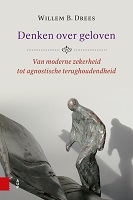Denken over geloven
Van moderne zekerheid tot agnostische terughoudendheid
Abstract
How to think philosophically about religion? The separation of church and state takes form in the nineteenth century. In public universities in the Netherlands, systematic, church-related theology is replaced by philosophy of religion. As a window on academic thinking about faith, Willem B. Drees, Leiden University's last professor of philosophy of religion, reads the work of his predecessors. They were mostly modernists, who expected to find their footing in the use of reason, in historical knowledge about religions, or in personal faith. After World War I, faith is perceived more as a wager, to trust that life is meaningful. Later, we see agnostic reticence that is religiously motivated, because God is always greater than we think, a mystery. And scholarly reticence, because in academic terms nothing definitive can be said about God. Do we thus see a development from modern certitude to charged silence?


 Download
Download